study pool
WE OFFER WELL RESEARCHED , CREDIBALE READING AND REVISION MATERIALS .
PAST PAPERS , EXAMS , TEST PAPERS AND QUIZ PAPERS ALL AVAILABLE
NURSING
MED SURG
SOFTWARE ENGINEERING
ENGINEERING
ECONOMICS
LAW
ART
BIOLOGY
MATH
CHEMISTRY
ETC.
- 453
- 0
- 17
Community
- Followers
- Following
1 Reviews received
470 items
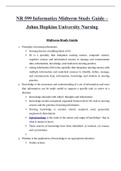
NR 599 Informatics Midterm Study Guide – Johns Hopkins University Nursing
1. Principles of nursing informatics • Nursing Science a building block of NI • NI is a specialty that integrates nursing science, computer science, cognitive science and information science to manage and communicate data, information, knowledge, and wisdom in nursing practice. • ursing informatics (NI) is the specialty that integrates nursing science with multiple information and analytical sciences to identify, define, manage, and communicate data, information, knowledge and wisdom i...
- Exam (elaborations)
- • 7 pages •
1. Principles of nursing informatics • Nursing Science a building block of NI • NI is a specialty that integrates nursing science, computer science, cognitive science and information science to manage and communicate data, information, knowledge, and wisdom in nursing practice. • ursing informatics (NI) is the specialty that integrates nursing science with multiple information and analytical sciences to identify, define, manage, and communicate data, information, knowledge and wisdom i...
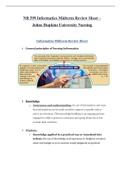
NR 599 Informatics Midterm Review Sheet – Johns Hopkins University Nursing
2. Knowledge o Awareness and understanding of a set of information and ways that information can be made useful to support a specific task or arrive at a decision. This knowledge building is an ongoing process engaged in while a person is conscious and going about his or her normal daily activities.
- Exam (elaborations)
- • 14 pages •
2. Knowledge o Awareness and understanding of a set of information and ways that information can be made useful to support a specific task or arrive at a decision. This knowledge building is an ongoing process engaged in while a person is conscious and going about his or her normal daily activities.
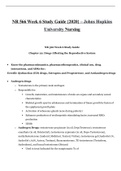
NR 566 Week 6 Study Guide {2020} – Johns Hopkins University Nursing
• Know the pharmacodynamics, pharmacotherapeutics, clinical use, drug interactions, and ADRs for: Erectile dysfunction (ED) drugs, Estrogens and Progesterone, and Antiandrogen drugs • Androgen drugs o Testosterone is the primary male androgen o Responsible for: Growth, maturation, and maintenance of male sex organs and secondary sexual characteristics Skeletal growth spurt in adolescence and termination of linear growth by fusion of the epiphyseal growth plate Activatio...
- Exam (elaborations)
- • 45 pages •
• Know the pharmacodynamics, pharmacotherapeutics, clinical use, drug interactions, and ADRs for: Erectile dysfunction (ED) drugs, Estrogens and Progesterone, and Antiandrogen drugs • Androgen drugs o Testosterone is the primary male androgen o Responsible for: Growth, maturation, and maintenance of male sex organs and secondary sexual characteristics Skeletal growth spurt in adolescence and termination of linear growth by fusion of the epiphyseal growth plate Activatio...
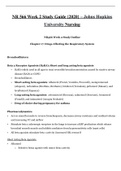
NR 566 Week 2 Study Guide {2020} – Johns Hopkins University Nursing
Beta 2 Receptor Agonists (B2RA): Short and long acting beta agonists • B2RA widely used in all ages to treat reversible bronchoconstriction caused by reactive airway disease (RAD) or COPD • Bronchodilators • Short-acting beta agonists: Albuterol (ProAir, Ventolin, Proventil) , metaproterenol (Alupent), terbutaline (Brethine, Brethaire), bitolterol (Tornalate), pirbuterol (Maxair), and levalbuterol (Xopenex) • Long-acting beta agonists: arformoterol (Brovana), salmet...
- Exam (elaborations)
- • 49 pages •
Beta 2 Receptor Agonists (B2RA): Short and long acting beta agonists • B2RA widely used in all ages to treat reversible bronchoconstriction caused by reactive airway disease (RAD) or COPD • Bronchodilators • Short-acting beta agonists: Albuterol (ProAir, Ventolin, Proventil) , metaproterenol (Alupent), terbutaline (Brethine, Brethaire), bitolterol (Tornalate), pirbuterol (Maxair), and levalbuterol (Xopenex) • Long-acting beta agonists: arformoterol (Brovana), salmet...
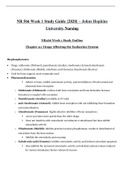
NR 566 Week 1 Study Guide {2020} – Johns Hopkins University Nursing
Bisphosphonates • Drugs: etidronate (Didronel), pamidronate (Aredia), risedronate (Actonel) alendronate (Fosamax), tiludronate (Skelid), zoledronic acid (Zometa), ibandronate (Boniva) • Used for bone support, most commonly used • Pharmacodynamics Adhere to bone, inhibit osteoclastic activity, potent inhibitors of both normal and abnormal bone resorption o Etidronate (Didronel): reduces both bone resorption and bone formation because formation is coupled with resorption o Pamidro...
- Exam (elaborations)
- • 42 pages •
Bisphosphonates • Drugs: etidronate (Didronel), pamidronate (Aredia), risedronate (Actonel) alendronate (Fosamax), tiludronate (Skelid), zoledronic acid (Zometa), ibandronate (Boniva) • Used for bone support, most commonly used • Pharmacodynamics Adhere to bone, inhibit osteoclastic activity, potent inhibitors of both normal and abnormal bone resorption o Etidronate (Didronel): reduces both bone resorption and bone formation because formation is coupled with resorption o Pamidro...
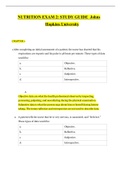
NUTRITION EXAM 2: STUDY GUIDE Johns Hopkins University NURSING
After completing an initial assessment of a patient, the nurse has charted that his respirations are eupneic and his pulse is 58 beats per minute. These types of data would be: a. Objective. b. Reflective. c. Subjective. d. Introspective. A Objective data are what the health professional observes by inspecting, percussing, palpating, and auscultating during the physical examination. Subjective data is what the person says about him or herself during history taking. The terms reflectiv...
- Exam (elaborations)
- • 192 pages •
After completing an initial assessment of a patient, the nurse has charted that his respirations are eupneic and his pulse is 58 beats per minute. These types of data would be: a. Objective. b. Reflective. c. Subjective. d. Introspective. A Objective data are what the health professional observes by inspecting, percussing, palpating, and auscultating during the physical examination. Subjective data is what the person says about him or herself during history taking. The terms reflectiv...
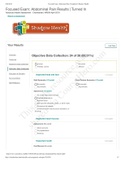
NR 509 Focused Exam Abdominal Pain Objective Johns Hopkins University.
NR 509 Focused Exam Abdominal Pain Objective Johns Hopkins University.
- Exam (elaborations)
- • 7 pages •
NR 509 Focused Exam Abdominal Pain Objective Johns Hopkins University.
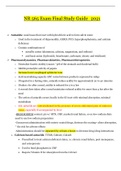
NR 565 Exam Final Study Guide_2021
Antacids: weak bases that react with hydrochloric acid to form salt & water. o Used in the treatment of Hyperacidity, GERD, PUD, hyperphosphatemia, and calcium deficiency o Contain combinations of ▪ metallic cation (aluminum, calcium, magnesium, and sodium) ▪ and basic anion (hydroxide, bicarbonate, carbonate, citrate, and trisilicate)
- Exam (elaborations)
- • 52 pages •
Antacids: weak bases that react with hydrochloric acid to form salt & water. o Used in the treatment of Hyperacidity, GERD, PUD, hyperphosphatemia, and calcium deficiency o Contain combinations of ▪ metallic cation (aluminum, calcium, magnesium, and sodium) ▪ and basic anion (hydroxide, bicarbonate, carbonate, citrate, and trisilicate)
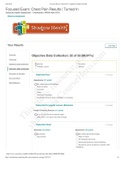
NR 509 Focused Exam Chest Pain OBJECTIVE - Johns Hopkins University
NR 509 Focused Exam Chest Pain OBJECTIVE - Johns Hopkins University
- Exam (elaborations)
- • 9 pages •
NR 509 Focused Exam Chest Pain OBJECTIVE - Johns Hopkins University
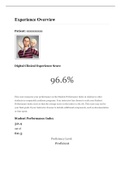
NR 566 Focused_Exam_Long_Bone_Fracture - Johns Hopkins University (NURSING)
This score measures your performance on the Student Performance Index in relation to other students in comparable academic programs. Your instructor has chosen to scale your Student Performance Index score so that the average score on the index is a 80.0%. This score may not be your final grade if your instructor chooses to include additional components, such as documentation or time spent.
- Exam (elaborations)
- • 122 pages •
This score measures your performance on the Student Performance Index in relation to other students in comparable academic programs. Your instructor has chosen to scale your Student Performance Index score so that the average score on the index is a 80.0%. This score may not be your final grade if your instructor chooses to include additional components, such as documentation or time spent.

ATI PN MENTAL HEALTH PROCTORED EXAM 2020